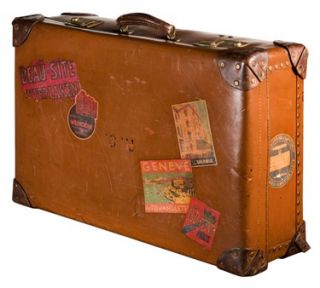Positive Psychology
Hail to Rolling Luggage
I say hail to rolling luggage as well as happy birthday!
Posted August 26, 2012
The world hates change, yet it is the only thing that has brought progress. — Charles Kettering
I recently took an AMTRAK train from Ann Arbor to Chicago for a weekend visit with my parents. Because I would be gone for just a few days, I decided to take a duffel bag rather than my rolling luggage. I regretted this decision very quickly when I parked my car several blocks away from the train station. In addition to a few changes of clothing, I brought with me several hardcover books and my laptop computer. I came close to dislocating my shoulder as I schlepped my duffel bag down the sidewalk.
Underscoring my regret was an article I read in the USA Today newspaper I picked up to read on the train (Clark, 2012). Apparently, August 2012 marked the 25th anniversary of the invention of rolling luggage, aka rollaboards. If you think about it, it is rather remarkable that this godsend is a relatively recent arrival on the scene and moreover that we know how who invented it, a Northwest Airline pilot named Bob Plath. Tired of carrying his luggage on a bulky metal trolley, he fashioned his own rolling bag by attaching a luggage trolley base directly to a suitcase.

Vintage Luggage
Younger readers may be surprised that travel used to entail carrying, not rolling, one’s bags. Indeed, the word luggage is derived from the verb to lug, meaning to drag. Packing for a trip used to mean taking into account not just what one wanted to take but also what one could realistically lift and lug.
Once Bob Plath created rolling luggage, the world changed. There are hundreds if not thousands of different types of rolling bags. Most are now vertical rather than horizontal, and most can be expanded and contracted as needed, changes from the previous generation of hard-sided bags. The insides of commercial airplanes have been reconfigured so that the standard 22” variety can be placed in overhead compartments.
If only the insides of airplanes could be reconfigured to fit tall travelers like me, or even just standard-sized travelers! Oh well. I won’t engage in wild fantasy. I will simply be grateful for what we do have, at least if we decide to use it. I say hail to rolling luggage as well as happy birthday!
Positive psychologists distinguish between pleasures and comforts. The former produce positive feelings when present, whereas the latter produce negative feelings when absent. I suggest that we also acknowledge conveniences, which seem to straddle the line between pleasures and comforts. Conveniences make our lives easier and often better, if only because they free us to do things that really matter.
Think self-adhesive postage stamps, cell phones, and television remote controls. Think Kindles and NOOKs. Think the optical mouse you probably use to point-and-click without worry that your sticky desk surface will mess up your computer work. If you are old enough, think Liquid Paper*, which once upon a time allowed convenient correction of errors made while typing. And think rolling luggage.
One of the ideas we occasionally talk about in positive psychology is the long-cut, meaning that some activities are better pursued leisurely and deliberately as opposed to quickly and automatically. Long-cuts allow us to savor ongoing life.
Is my praise of conveniences at odds with the virtues of long-cuts? Not exactly. Much as it is wonderful to savor ongoing life, whatever is ongoing needs to be worth savoring in the first place. And I’m not sure that schlepping a duffel bag loaded with books and a computer is all that worth savoring**. Indeed, when I am rolling rather than schlepping, I am free to look around me and actually enjoy my travel.
Travel well and merrily, dear reader, and please roll along.
* A factoid that I love, again showing my age, is that the person credited with the invention of Liquid Paper is Betty Nesmith Graham, the mother of Mike Nesmith of the 1960s musical group the Monkees. You remember him, the guy with the hat. Thanks Wikidedia, a considerable convenience in its own right.
** In keeping with typical media coverage, the USA Today article tried to be fair and balanced in its account of rolling luggage. That means someone had to be found who was willing to be critical. So, adventure traveler Richard Bangs was quoted to the effect that luggage one carries builds muscles and counteracts the effects of sitting motionless for hours on a plane. I assume the writer of the article had to look far and wide for Mr. Bangs.
Reference
Clark, Jayne (2012, August 17). A wheelie big birthday: Rollaboards carry on at 25. USA Today, p. 3D.




